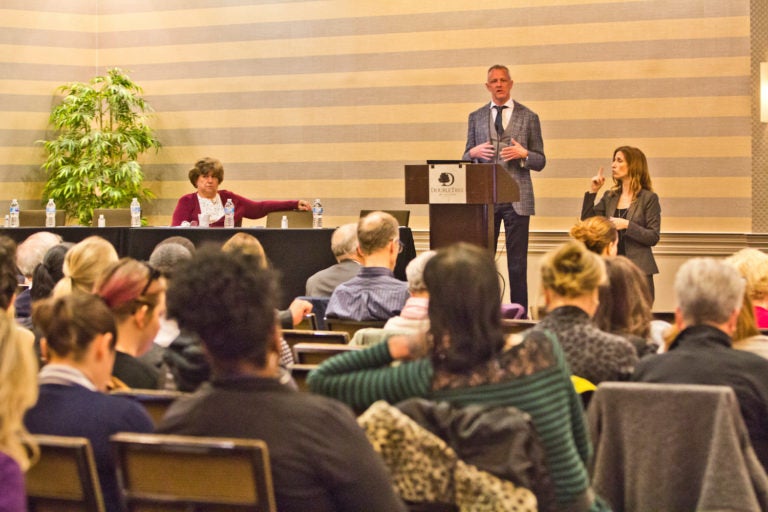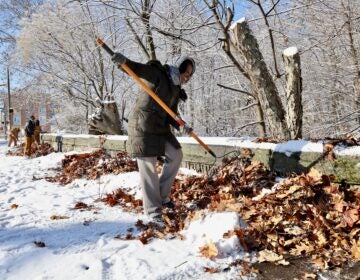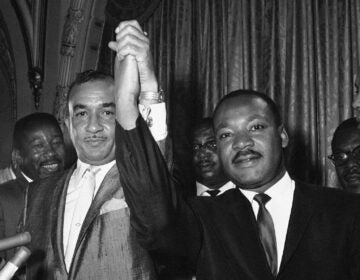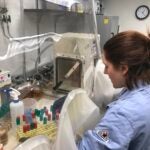How can we manage COVID-19? 5 ideas from Philly’s health community
Philadelphia reported its first case of COVID-19 this week, but more lie ahead. On Wednesday, experts talked about how to limit its spread here.

Dr. Steve Alles, director of disease control at the Philadelphia Department of Health, addresses the health care community at a COVID-19 symposium on Wednesday. (Kimberly Paynter/WHYY)
The Philadelphia Department of Health assembled experts in public health, disease control and related research Wednesday to discuss what is being done to stop transmission of the coronavirus and prepare the city to manage COVID-19. Though other parts of the region had already reported presumed positive cases of the virus, Philly’s first case was reported only Tuesday.
Here are five takeaways from the symposium:
Limit gatherings
Steve Alles, director of the Division of Disease Control at the city’s Department of Public Health, said the current recommendation is not to attend gatherings of more than 5,000 people. But it’s also worth applying this more generally, he said: Think about the who, the what and the where.
The what: Avoid events that involve singing, chanting or cheering. The coronavirus, Sars-CoV-2, is spread via viral droplets that can travel in the saliva of infected people. When you cheer or yell, you just increase the chance you’ll spread the virus.
The who: Consider who will be at a social gathering. Groups of people in high-risk categories, like the elderly or those with pre-existing conditions, should be limited.
The where: Consider the space. Social distancing is the name of the game. The Centers for Disease Control and Prevention suggest 6 feet, so imagine your tallest friend lying down, and try to stay that distance away from other people. Tight spaces make transmission even more likely, because they hinder social distancing.
Fight the surge
Jessica Caum, manager of the city’s Bioterrorism and Public Health Preparedness Program, talked about guidelines for health care and what’s known as “flattening the curve.” Essentially, we want to stop the exponential spread of the virus. One person, without taking precautions, would spread the virus to between 1.5 and 3.5 people, and they would spread it to another 1.5 to 3.5 people. If the virus were allowed to spread in this way, the number of cases would balloon and stress essential services, like hospitals. Limiting the spread of cases is key.
So, postpone elective or non-essential surgery. That keeps people out of the hospital. Move appointments and procedures to outpatient facilities — that does the same thing, keeping people out of hospitals. Consider using telemedicine, either for a routine appointment or to get a COVID-19 assessment, to reduce the traffic in hospitals and doctor’s offices. Fewer people in hospitals means lower risks of infection for everyone, and more resources to go around in the hospital.
Stay home when you’re sick
Following best advice, city Health Commissioner Thomas Farley joined the symposium remotely. He was staying at home because he had cold symptoms.
The coronavirus has a four- to six-day incubation period, Farley said. That means it will take four to six days from infection to the appearance of symptoms, so even if you aren’t sick, but have reason to believe you had contact with a case of COVID-19, talk to your doctor. If you feel sick, stay home.
Know the risk factors
Kristen Feemster, medical director at the city Health Department, offered up some statistics about the COVID-19 fatality rate, and the risk to Philadelphians in general.
The fatality rate is 2.0 to 2.3% overall, with the highest rate, 14.8%, among patients over 80. For patients over 60, those in the 70-79 age range were at an 8% fatality rate, and those 60- to 69 were at 3.6% fatality rate. For those patients who are under 60 with no other health conditions, the fatality rate was 0.9%.
What is the risk to all of us? At a high risk, Feemster said, are those who live with someone with COVID-19 and are not taking the recommended precautions, or who don’t know the person they’re living with is sick. At medium risk are people who come in contact with a COVID-19 case and use precautions, or people who have recently traveled to an area with an outbreak.
If you have come in contact with a case of COVID-19, even if you and that person were in the same physical space, you are still at low risk.
A vaccine is coming, but not quickly
Pablo Tebas, a researcher at the University of Pennsylvania, said Inovio, which is based in Plymouth Meeting, is working on a vaccine, INO-4800. It is in preclinical testing and will be ready for human testing in early summer. But that doesn’t mean the general public will have access to it in early summer. The safety testing won’t be done till late August or the beginning September, at the earliest.
Big picture
Slowing the spread of COVID-19 is everyone’s responsibility. Many of the strategies like public distancing and self-quarantine rely on people electing to do so. If you think you have COVID-19 and need to go to the doctor’s office or the ER, call ahead so they can prepare. Even if you aren’t very sick, if you are in the health population with a very low fatality rate, you could give the virus to someone who is at a high risk. So stay healthy, keep washing your hands, and stay informed.
Philadelphia has launched an emergency operation center that will coordinate activities of the Fire Department, the Health Department, SEPTA and more. You can enroll in free alerts from the city by texting COVIDPHL to 888-777. You can also get updates from the Department of Public Health’s website.
WHYY is your source for fact-based, in-depth journalism and information. As a nonprofit organization, we rely on financial support from readers like you. Please give today.





